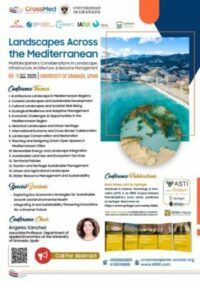ISSN (online): 2076-3298
Call of the Journal:
- Dynamic of Vegetation and Climate Change
- Environmental Implications of COVID-19 Pandemic
- Environmental Sustainability – Life Cycle Assessment – Energy and Environmental Technology
- Groundwater Quality and Groundwater Vulnerability Assessment
- Indoor and Outdoor Air Particulate Matter
- Monitoring and Assessment of Environmental Quality in Coastal Ecosystems
- Monitoring and Management of Inland Waters
- Multiple Approaches for Environmental Assessment of Transitional and Coastal Waters
- Plastic Contamination | Challenges and Solutions
- Response to Current Air Quality Changes in Small and Large Areas
- Restorative Agriculture
- Risk Assessment for Workplace Exposure to Natural Radioactivity
- Rural-Urban Relations and Sustainable Food Systems
- Soil Pollution Assessment and Sustainable Remediation Strategies
Apr
2021
Inland waters are important ecosystems for both their biodiversity and the services they provide to humans. Monitoring their components is essential to improve the knowledge of structure and functions of these ecosystems and to assess their health status. Monitoring is also fundamental to evaluate the impact of anthropic pressures, such as water use for hydropower, irrigation, or drinking purposes, pollution due to present and past production and use of chemicals, and the introduction of allochthonous species. Only through the information coming from monitoring data can the management of water resources be planned or improved in order to continue to exploit them for necessary services with a lower impact on the freshwater environment. This Special Issue aims to: (i) provide information on tools currently applied for the monitoring of different (both abiotic and biotic) components of freshwater ecosystems, (ii) show results of monitoring carried out to improve the basic knowledge of these aquatic environments and their health status and/or to highlight the impact of different anthropic pressures, and (iii) collect new evidence about eco-friendly management strategies related to the use of water resources or to activities impacting on inland waters.
Keywords: freshwaters; monitoring tools; monitoring data; ecosystem health; anthropic pressures; ecological impact; management strategies.
Monitoring and Management of Inland Waters
Inland waters are important ecosystems for both their biodiversity and the services they provide to humans. Monitoring their components is essential to improve the knowledge of structure and functions of these ecosystems and to assess their health status. Monitoring is also fundamental to evaluate the impact of anthropic pressures, such as water use for hydropower, irrigation, or drinking purposes, pollution due to present and past production and use of chemicals, and the introduction of allochthonous species. Only through the information coming from monitoring data can the management of water resources be planned or improved in order to continue to exploit them for necessary services with a lower impact on the freshwater environment. This Special Issue aims to: (i) provide information on tools currently applied for the monitoring of different (both abiotic and biotic) components of freshwater ecosystems, (ii) show results of monitoring carried out to improve the basic knowledge of these aquatic environments and their health status and/or to highlight the impact of different anthropic pressures, and (iii) collect new evidence about eco-friendly management strategies related to the use of water resources or to activities impacting on inland waters.
Keywords: freshwaters; monitoring tools; monitoring data; ecosystem health; anthropic pressures; ecological impact; management strategies.
AGRICOLA (National Agricultural Library), AGRIS Agricultural Sciences and Technology (FAO), DOAJ, Emerging Sources Citation Index – Web of Science (Clarivate Analytics), Genamics JournalSeek, GeoRef (American Geosciences Institute),Norwegian Register for Scientific Journals, Series and Publishers (NSD), Scopus (Elsevier) Web of Science (Clarivate Analytics), CLOCKSS (Digital Archive), e-Helvetica (Swiss National Library Digital Archive), Academic OneFile (Gale/Cengage Learning), Google Scholar J-Gate (Informatics India), ProQuest Central (ProQuest), Science In Context (Gale/Cengage Learning), WorldCat (OCLC).
Info at: www.mdpi.com/journal/environments/apc
Guest Editor
Dr. Silvia Quadroni










